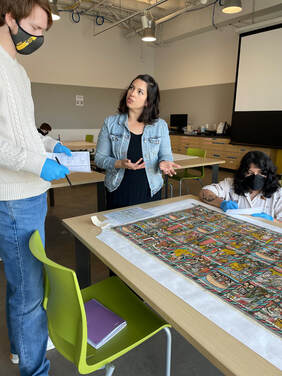 During the 2023 spring semester, BACC collaborated with the Museum Studies Program of San Diego Mesa College to integrate conservation knowledge into their curriculum and highlight the role of art conservation within the larger museum ecosystem. The Mesa College project is part of BACC’s larger Workforce Development Initiative. Funded in part by the Conrad Prebys Foundation, the initiative aims to engage students at all educational levels in conservation. This is essential in building a more diverse conservation sector. When considering potential careers, few students know conservation is a career path. This is especially true among communities whose cultural heritage has been underrepresented within cultural institutions and who have been excluded from arts and conservation access. Home to one of the few museum studies programs in Southern California, Mesa College’s student body is 71% BIPOC. The program is led by artist and curator Alessandra Moctezuma. The lack of awareness about conservation and preservation among the public parallels the systemic lack of arts education in this country, which predominantly affects schools with a larger percentage of non-white students, low-income, and English learners. This initiative seeks to help address these inequities by working with majority BIPOC schools to expose their students to conservation as a potential career path. The programming is developed by Associate Paintings Conservator and Programs Manager Bianca Garcia, with support from Executive Director Leticia Gomez Franco, Kress Conservation Fellow Annabelle Camp, and former graduate intern and current WUDPAC Fellow, Adriana Benavides. Over the past year, the programming has taken multiple shapes, as we have responded to the needs of our educational partners. BACC has partnered with the Mesa College Museum Studies program previously, hosting students on tours in our lab spaces. However, these have been one-time interactions without opportunity for in-depth discussions and hands-on activities. Additionally, it is essential that program faculty have the materials and knowledge to incorporate conservation education routinely into their curriculum. Following a “train the trainer” model, BACC conservators established a series of conservation education modules that could be integrated into the accepted museum studies coursework. These modules included introduction to conservation, preventive conservation and sustainability, and the ethics of conservation. Each module includes a designated exercise for students and associated resources. To test and further develop the curriculum, BACC conservators acted as visiting lecturers in the course, delivering modules on the introduction to conservation and preventive conservation and sustainability. Students were eager to learn about the field and pathways into conservation. As part of the hands-on exercises, they conducted condition assessments of objects from the Mesa College World Cultures collection and learned how to create archival enclosures for works on paper. Following the lecture, the class had the opportunity to visit BACC’s lab spaces, see the ongoing treatment of paintings and textiles, and discuss conservation ethics and approaches. By first incorporating conservation knowledge into their course content, students were able to come to the tour prepared with a deeper understanding of the conservators’ work and many critical questions. Professor Alessandra Moctezuma noted that the initial lecture “turned on the students’ critical thinking skills,” ahead of their onsite visit to BACC, demonstrating the importance of multiple interactions with students as they are introduced to this complex and multifaceted field. Following this pilot program, Professor Moctezuma is now prepared to integrate an introduction to art conservation into her syllabus, ensuring that generations of Mesa students will be exposed to the field, its value as a career path, and its role in the museum ecosystem. |
Categories
All
Archives
June 2024
|
